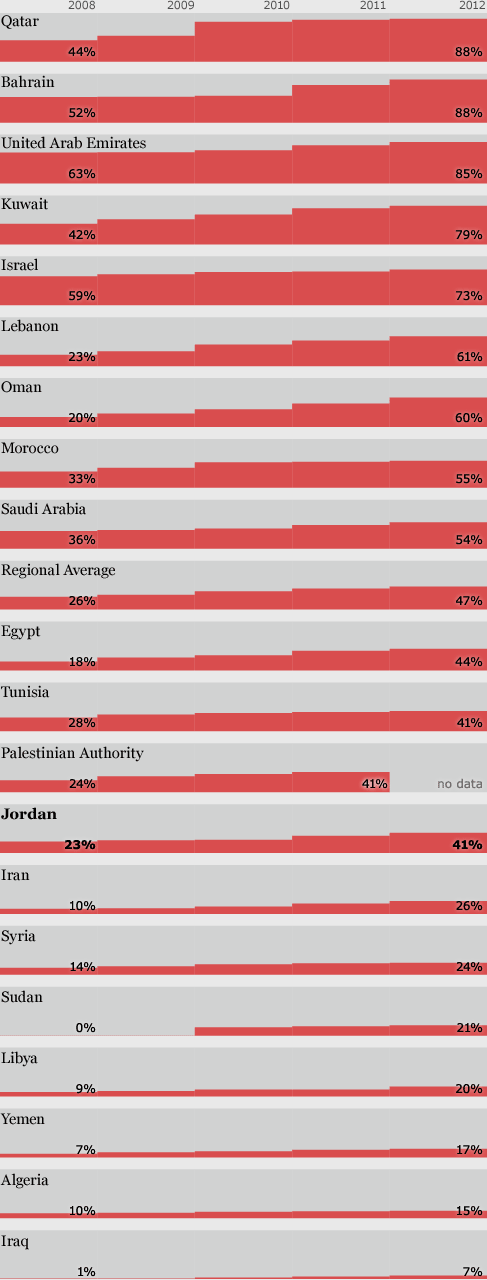Although Jordanian journalists continued to enjoy greater freedom than most of their regional colleagues, that freedom was nonetheless restricted. The government continued its attempt to control the online media as it already controls traditional media. As CPJ had warned last year, the Jordanian government used the amended Press and Publications Law to block hundreds of websites that had failed to register with the government, despite protests by local journalists and promises by government officials to discuss amending the law. The country also ranked below the regional average in Internet use. The government maintained its long-standing practice of restricting coverage of sensitive issues, including local protests and the royal family. At the same time, Jordan opened its doors to numerous international journalists covering the massive influx of Syrian refugees into the country.
Jordan
» Government blocks hundreds of unlicensed websites, including major news sites.
» Authorities continue to restrict coverage of issues, especially protests.
Although Jordanian journalists continued to enjoy greater freedom than most of their regional colleagues, that freedom was nonetheless restricted. The government continued its attempt to control the online media as it already controls traditional media. As CPJ had warned last year, the Jordanian government used the amended Press and Publications Law to block hundreds of websites that had failed to register with the government, despite protests by local journalists and promises by government officials to discuss amending the law. The country also ranked below the regional average in Internet use. The government maintained its long-standing practice of restricting coverage of sensitive issues, including local protests and the royal family. At the same time, Jordan opened its doors to numerous international journalists covering the massive influx of Syrian refugees into the country.
-
304
Number of websites banned -
576,354
Syrian refugees in Jordan -
2
Journalists jailed -
41%
Internet penetration
The Jordanian government ordered Internet service providers to block 304 websites that failed to register under the 2012 Press and Publications Law.
September 17, 2012: | Amendments to the Press and Publication Law pass, requiring all websites to register with the government. |
January 17, 2013: | Websites are issued a deadline to register under the amended press law. |
May 20, 2013: | Prime Minister Abdullah Ensour denies that the amended law restricts press freedom. |
June 1, 2013: | The Department of Press and Publications issues a memo to the Jordanian Telecommunications Regulatory authority, asking it to block the websites. |
June 2, 2013: | The Jordanian Telecommunications Regulatory Authority orders Internet service providers to block the websites. |
June 19, 2013: | CPJ writes a letter to Prime Minister Ensour, asking him to reverse the order to block websites. |
June 29, 2013: | Owners of the websites sue to rescind ban against their sites. |
Numerous journalists sought permission to enter Jordan over the year to cover the stories of approximately half a million Syrian refugees who fled to Jordan in 2013. As of December 31, 576,354 Syrians had registered with UNHCR in Jordan. Journalists wishing to cover their stories had to apply for special permission from the government’s Press and Publications Department, which granted thousands of permits for journalists to enter the refugee camps.
April 23, 2013: | The Washington Post: “In Jordan, tensions rise between Syrian refugees and host community,” Taylor Luck. “After months of shrugging off glares, Abdullah Saad could no longer ignore the feeling that he was unwelcome in this country. The message was spray-painted in red across the side of his home for any passer-by to see: Go back to Syria." |
June 5, 2013: | The Nation: “A Syrian Refugee Wedding,” Lauren Wolfe. “This is not a wedding Mohamed wanted just yet. But after five months in Zaatari and no better future in sight, he can no longer provide for Nada, so he’s decided to accept the bride price of 125,000 Syrian lira (about US$1,280) and allow his daughter to marry an 18-year-old I’ll call Mazen. Mohamed has many other children to feed, including a 2-month-old girl whose shirt he yanks up, revealing more ribs than a baby should show. ‘It’s like Somalia here,’ Mohamed says, pointing at his daughter. ‘We are dying slowly.’” |
August 26, 2013: | The New Yorker: “City of the Lost,” David Remnick. “In Za’atari, the dispossession is absolute. Everyone has lost his country, his home, his equilibrium. Most have lost a family member or a close friend to the war. What is left is a kind of theatrical pride, the necessary performance of will.” |
At least two Jordanian journalists were imprisoned, according to CPJ's annual prison census conducted on December 1. This is the first time Jordan appeared on CPJ's prison census in more than 20 years.
| Rank | Country | Imprisoned (2013) | Population in Millions (World Bank) | Journalists Imprisoned (Per Million) |
| 1 | Eritrea | 22 | 6.1 | 3.59 |
| 2 | Bahrain | 3 | 1.3 | 2.28 |
| 3 | Azerbaijan | 8 | 9.3 | 0.86 |
| 4 | Gambia | 1 | 1.8 | 0.56 |
| 5 | Turkey | 40 | 74.0 | 0.54 |
| 6 | Syria | 12 | 22.4 | 0.54 |
| 7 | Macedonia | 1 | 2.1 | 0.47 |
| 8 | Iran | 35 | 76.4 | 0.46 |
| 9 | Jordan | 2 | 6.3 | 0.31 |
| 10 | Kuwait | 1 | 3.3 | 0.31 |
Even as the Jordanian government moved to assert greater control over online discourse, the majority of Jordanians still did not use the Internet. Jordan ranked below the regional average, with only 41 percent of citizens using the Internet, according to statistics published by the International Telecommunication Union.

